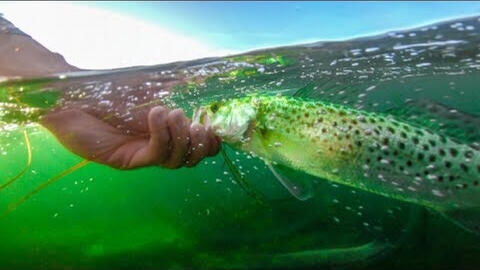How to Fish in the Wild: Mastering the Art with Simple Techniques
When it comes to enjoying the tranquility of the great outdoors, few activities can match the serenity of fishing. Whether you're a seasoned angler or a beginner looking to cast your line into the wild, there are several simple techniques and tips that can help you increase your chances of a successful catch. Here's how to fish in the wild like a pro, using some practical and innovative techniques.
Choose the Right Location
The first step to successful fishing in the wild is to find the perfect spot. Look for areas with clear signs of fish activity, such as rocks, logs, or areas where the water flows slower. Observe the behavior of the fish and try to identify their preferred habitats. Remember, different species of fish thrive in different environments, so tailor your location choice accordingly.
Understand the Fish You're Targeting
Each type of fish has its own unique preferences and behaviors. Research the species you're interested in catching, and understand their feeding patterns, preferred baits, and the depths they inhabit. For example, bass are often found in deeper water, while panfish like to be closer to the surface. Knowing these details can help you tailor your approach and increase your chances of a successful catch.
Prepare Your Gear Wisely
When you're fishing in the wild, it's crucial to have the right gear. Here are some essential items to consider:
- Rod and Reel: Choose a rod and reel that match the type of fish you're targeting. Lightweight spinning rods are great for panfish, while heavier rods are better for larger species.
- Line: Use a line that matches the strength of the fish you're aiming to catch. Monofilament is versatile and works well for most freshwater fishing, but consider using braided line for added strength and sensitivity.
- Hooks: The size and type of hook depend on the bait you're using and the fish you're targeting. Larger hooks are suitable for bigger fish, while smaller hooks are better for smaller species.
- Bait: Live bait, such as worms, minnows, or crickets, can be very effective. Artificial lures, like spinners or jigs, can also be used to attract fish.
Use Natural Baits and Lures
Fish are naturally attracted to movement and food. When choosing your bait or lure, opt for something that mimics the natural prey of the fish you're targeting. For example, if you're fishing for bass, using a lure that resembles a minnow can be highly effective. Live bait can also be an excellent choice, as it provides a more realistic food source for the fish.
Master the Art of Casting
Casting is a fundamental skill in fishing. Practice your casting technique to ensure you can accurately place your bait or lure in the water. There are various casting techniques, such as the overhead cast, sidearm cast, and roll cast. Experiment with different methods to find the one that works best for you and the conditions you're facing.
Be Patient and Observant
Fishing is a waiting game. Be patient and observant, and don't get discouraged if you don't catch anything right away. Pay attention to the water's surface, as fish often exhibit subtle movements that indicate their presence. Adjust your technique based on what you observe.

Use the Elements to Your Advantage
The weather and time of day can greatly impact fish activity. Fish are often more active during the early morning or late evening, when the water is cooler. Use these times to your advantage, and be prepared to adapt your strategy based on the weather conditions.
Stay Informed About Local Regulations
Before you head out, make sure you're aware of any local fishing regulations, such as size limits, bag limits, and seasonal restrictions. Violating these regulations can result in fines or other penalties, so it's important to stay informed and respect the rules.
Conclusion
Fishing in the wild can be a rewarding and enjoyable experience, as long as you're prepared and use the right techniques. By choosing the right location, understanding your target species, preparing your gear wisely, and mastering the art of casting, you'll be well on your way to a successful fishing trip. Remember to be patient, observant, and respectful of the natural environment, and you'll find that the wild offers some of the best fishing experiences of all.












